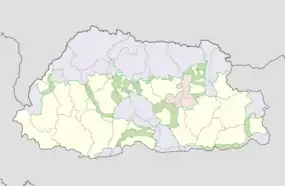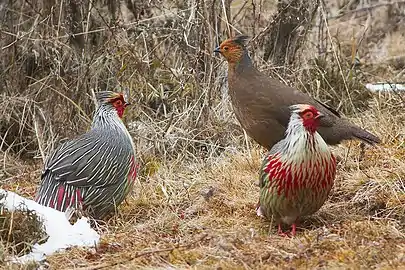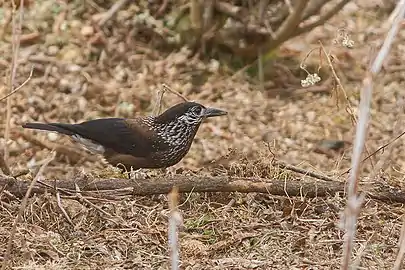Phrumsengla National Park
| Phrumsengla National Park | |
|---|---|
 | |
| Location | Bumthang, Lhuntse, Mongar, Zhemgang, Bhutan |
| Area | 905.05 km2 (349.44 sq mi) |
| Established | 1998[1][2] |
| Owner | Royal Government of Bhutan |
| Website | Bhutan Trust Fund for Environmental Conservation |
Phrumsengla National Park (Dzongkha: ཕུརམ་སེང་ལ་རྒྱལ་ཡོངས་གླིང་ག), formerly Thrumshingla National Park, in central Bhutan covers just over 905 square kilometres (349 sq mi) across four districts, but primarily in Mongar. It is bisected by the Lateral Road, and contains the Thrumshing La pass.
Flora and fauna
 flock of Blood Pheasant
flock of Blood Pheasant Spotted Nutcracker
Spotted Nutcracker
Phrumsengla is a temperate park with large tracts of old-growth fir forests, its altitudes ranging from 700 metres (2,300 ft) to 4,400 metres (14,400 ft). Phrumsengla is home to six species of threatened birds: the rufous-necked hornbill (Aceros nipalensis), rufous-throated wren-babbler (Spelaeornis caudatus), satyr tragopan (Tragopan satyra), beautiful nuthatch (Sitta formosa), Ward's trogon (Harpactes wardi) and Chestnut-breasted partridge (Arborophila mandellii), as well as the near-threatened wedge billed wren babbler (Sphenocichla humei). Phrumsengla has scenic views, including forests ranging with elevations from alpine to sub-tropical. Because the soil of Phrumsengla's biomes is particularly fragile, the land is unsuitable for logging or other development.[3][1][2]
Tourism
The Bhutanese Trust Fund identifies excellent tourism potential for Phrumsengla, as it is bisected by Bhutan's highest motorable road, the Lateral Road. Nearly 11,000 people live within the Phrumsengla area demonstrating, in the Trust Fund's opinion, the kingdom's "closest success to a harmonious balance between man and nature."[3] The World Wildlife Fund also maintains operations in the park.[1]
References
- "Forest protection in Thrumshingla National Park, Bhutan". WWF. Retrieved 2011-04-02.
- "Thrumshingla National Park". Himalaya 2000 online. Bhutan Travel Guide. Retrieved 2011-04-02.
- "Parks of Bhutan". Bhutan Trust Fund for Environmental Conservation online. Bhutan Trust Fund. Archived from the original on 2011-07-02. Retrieved 2011-03-26.